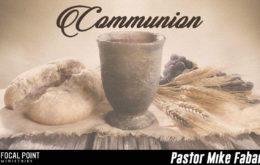
Communion
The Bible tells us that we need to take a good, long look at what is going on in our hearts when we partake in the Lord’s Supper. “Let a person examine himself, and so eat of the bread and drink of the cup,” Paul told the Corinthians (1Cor.11:28). In Corinth this intended act of “communion” with the Lord had become a thoughtless and even selfish church ritual. Their minds had clearly shifted from Christ’s substitutionary sacrifice and had wandered elsewhere.
We must not ever let that happen to us. We must stay mentally engaged when we partake of these elements. They have been ordained to soberly remind us of the high cost of God’s forgiveness (1Pt.1:18-19). Eating and drinking them vividly depicts our union and solidarity with Christ as our Savior, Lord and Source of spiritual life (1Cor.10:16). We should also take the time to examine ourselves to ensure that our relationship with Christ is authentic and genuine. Not only recalling the inauguration of our relationship with Christ, but also seeking to discover if there is any unconfessed sin impeding our current fellowship with God (1Jn.1:6-9).
Lastly, we would be remiss to ingest these symbols of Christ without a heart that is purposefully thankful. Paradoxically, the Lord’s Supper is not only a reminder of his brutal death, but it is also a celebration of the incredibly generous grace of God and the invaluable privilege of being forgiven. Partake with a grateful heart that can say along with generations of Christians, “Thanks be to God for his inexpressible gift!” (2Cor.9:15).

